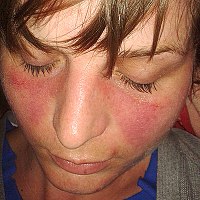
Photo from wikipedia
Objectives Sustained disease-modifying antirheumatic drug (DMARD)-free status, the sustained absence of synovitis after cessation of DMARD therapy, is infrequent in autoantibody-positive rheumatoid arthritis (RA), but approximates cure (ie, disappearance of… Click to show full abstract
Objectives Sustained disease-modifying antirheumatic drug (DMARD)-free status, the sustained absence of synovitis after cessation of DMARD therapy, is infrequent in autoantibody-positive rheumatoid arthritis (RA), but approximates cure (ie, disappearance of signs and symptoms). It was recently suggested that immunological remission, defined as disappearance of anti-citrullinated protein antibodies (ACPA) and rheumatoid factor (RF), underlies this outcome. Therefore, this long-term observational study determined if autoantibodies disappear in RA patients who achieved sustained DMARD-free remission. Methods We studied 95 ACPA-positive and/or RF-positive RA patients who achieved DMARD-free remission after median 4.8 years and kept this status for the remaining follow-up (median 4.2 years). Additionally, 21 autoantibody-positive RA patients with a late flare, defined as recurrence of clinical synovitis after a DMARD-free status of ≥1 year, and 45 autoantibody-positive RA patients who were unable to stop DMARD therapy (during median 10 years) were studied. Anti-cyclic citrullinated peptide 2 (anti-CCP2) IgG, IgM and RF IgM levels were measured in 587 samples obtained at diagnosis, before and after achieving DMARD-free remission. Results 13% of anti-CCP2 IgG-positive RA patients had seroreverted when achieving remission. In RA patients with a flare and persistent disease this was 8% and 6%, respectively (p=0.63). For anti-CCP2 IgM and RF IgM, similar results were observed. Evaluating the estimated slope of serially measured levels revealed that RF levels decreased more in patients with than without remission (p<0.001); the course of anti-CCP2 levels was not different (p=0.66). Conclusions Sustained DMARD-free status in autoantibody-positive RA was not paralleled by an increased frequency of reversion to autoantibody negativity. This form of immunological remission may therefore not be a treatment target in patients with classified RA.
Journal Title: Annals of the Rheumatic Diseases
Year Published: 2019
Link to full text (if available)
Share on Social Media: Sign Up to like & get
recommendations!